Band Of Holy Joy - Interview
by John Clarkson
published: 24 / 2 / 2014
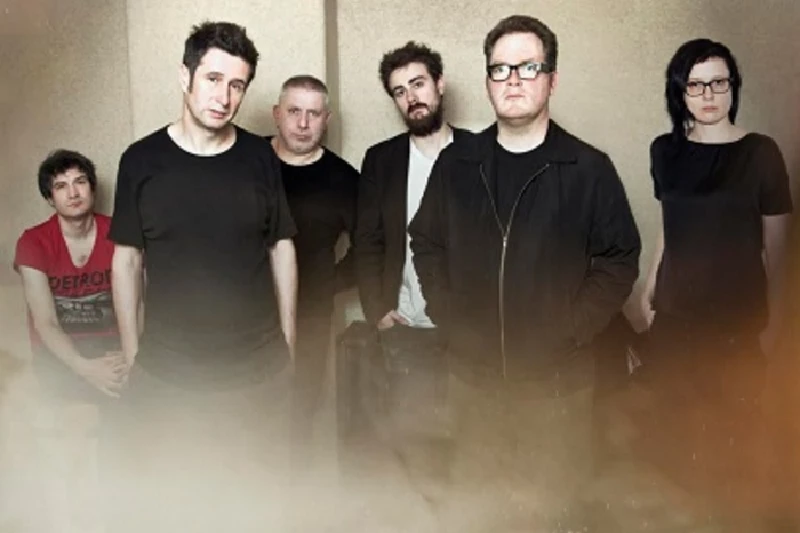
intro
John Clarkson speaks to Johny Brown from London-based alternative rock band the Band of Holy Joy about his group's life-affirming new album, 'Easy Listening'
“I’m suffering,” groans Johny Brown. “It turned into a bit of a night last night.” He is clearly not well. Although it is 4.30 p.m. in the afternoon of the next day, a hangover still weighs down on him and won’t budge. “It doesn’t happen very often these days,” he adds as a note of apology. “I went out for a few drinks with some friends I hadn’t seen for a while, and it got out of hand.” As he talks to Pennyblackmusic on the phone in his second interview with us about his group the Band of Holy Joy’s new album ‘Easy Listening’, he starts to, however, slowly become more animated. It is something of a cliché amongst musicians to boast that their latest album is their best one. Brown – a playwright, a filmmaker, a radio show host and a soon-to-be-published fiction author as well as a singer-songwriter – doesn’t do that. The Band of Holy Joy has a career that extends back over thirty years to the early 1980s, since Brown, its one lasting member, first formed his group in a New Cross squat, shortly after he arrived in London from his native Newcastle. There are over another fifteen Band of Holy Joy albums, each similarly individual and distinctive, which he could also choose from. ‘Easy Listening’ is, however, a record that he is obviously enormously, justifiably very proud of. The Band of Holy Joy’s last album, 2013’s ‘Cities of Tales (Vol. 1 and 2)’, was released on double cassette. With each of its two volumes having been recorded twenty-eight years apart, it found Brown looking on both with an appalled horror and loathing at his adopted city. The first, a reprise of the Band of the Holy Joy’s experimental third album from 1985, combined eerie, discordant industrial noises with only half audible vocals from Brown, which drifted in and out of the mix, and were suggestive of great violence as well as great tragedy. It was as oddly compelling as it was unsettling. On the second volume, the song structures and lyrics were at one level more conventional. The group’s use once again of ancient synthesisers and also this time Chris Brierley’s waspish violin, however, made the music equally jarring. Brown’s doom-ridden lyrical narratives meanwhile told of violence against prostitutes, drug overdoses, police corruption and cover-ups and of other straighter police officers driven to breakdown by the atrocities and serious crimes which they had witnessed. ‘Easy Listening’- or to give it its fuller title ‘Easy Listening for Uneasy Times’ – offers both more of the same, and yet something completely different. “It is at one level not ‘Easy Listening’ at all,” says Brown about the new album, which has been released on CD. “That title is very tongue-in-cheek. Obviously, however, ‘City of Tales’ was a pretty heavy piece of work, and we consciously at the same time wanted to move away and to do something more optimistic and hopeful and also a little more pleasurable.” In contrast to the discordant ‘City of Tales’, the music of ‘Easy Listening’ is lush and orchestral in sound. Largely breezy and elegiac in tone, it pushes at different points in its eight songs track listing Brierley’s now sweeping violins, Kacper Ziemianin’s lavish electronics, James Stephen Finn’s clean-cut guitar lines and Peter Smith’s gusty saxophone all to the fore. Two of the songs on ‘Easy Listening’ are re-workings of songs that originally appeared on the second volume of ‘City of Tales’. “We starting playing them as a band,” says Brown, explaining the reason for their inclusion. “We wrote and recorded ‘City of Tales’ in the studio and did it there and then, but then we started playing those songs in rehearsal during the last year and they took on a different life, so we wanted to get them down as they are now.” On the first of these, the brooding ‘I Have Travelled the Buses Late at Night’, Brown describes travelling through the streets of multicultural London in the early hours, and observing the class injustices and social divides of this self-proclaimed global city in which nevertheless the rich try “to drive the poor neatly out of sight/And bathe the streets in a clean new light.” “This city is a bitch,” he spits in conclusion in its last line. The second ‘There Was a Fall/The Fall’, (which on ‘City of Tales’ was called under its original title ‘Met Police Tried to Hide PC’s Disciplinary Record’), is written from the perspective of a coroner’s report . It tells of the cover-up into the death of Ian Tomlinson, a 47-year old newspaper seller, who died after being hit by a policeman after he was caught up in the 2009 G-20 summit protests on his way home from work. Both songs have been transformed between albums. ‘I Have Travelled the Buses Late at Night’ has been extended to almost twice the length, and concludes now with a long, sweeping instrumental. The changes on ‘There Was a Fall/The Fall’ are even more expansive still. A bleak, lo-fi number on the original ‘Met Police…’, it finished with James Stephen Finn and Chris Brierley’s solitary eerie guitar and violin pulling away and a capella vocal from Brown. On the orchestral ‘There Was a Fall/The Fall’ the band’s instruments, which are sinister and doomy, creep slowly upwards, and as Brown’s vocals reach a crescendo, in the one discordant point on ‘Easy Listening’, they crash down in a rush of avant-garde and tumultuous noise. “That is the straight coroner’s report,” Brown says about ‘There Was a Fall/The Fall’. “I didn’t touch it, other than to insert just one line – ‘The city concrete/The hardened pavement/The slab of street’. Otherwise it is a straight up report set to music. That was the second report also, as the first one was by this doctor Freddy Patel, who was found to be wanting and he was struck off the register in the end. It was a similar lot of lies, and that is evident if you read the report.” “I was in the area that day in the City of London where it happened, and I was on that protest. Ian Tomlinson wasn’t a protestor. He had a bit of a drink problem. He was, however, walking away from the police and on his way home. They tried to claim that he had had a heart attack because of his lifestyle. To cut him down like that was absolutely shocking.” ‘When a Gift is a Curse’, a gorgeous ballad centred around James Stephen Finn’s shimmering guitar work, tells of another death, this time of the Manchester United and Northern Ireland footballer George Best. Once described by the Irish Football Association as "the greatest player to ever pull on the green shirt of Northern Ireland", the Belfast-born Best was one of the most iconic figures of his generation, and in his heyday in the late 1960s and early 1970s Britain’s best paid footballer. He, however, fought a public and lifelong battle with alcoholism, and died aged just 59 in 2005, three years after publishing his autobiography ‘Blessed’, in which he wrote openly and wittily about his addiction. Best’s death resulted after he suffered kidney and then multiple organ failure caused from the side effects of the drugs he had to take, after he had controversially received a liver transplant a few years beforehand on the NHS. “It is ironic talking this afternoon about a song that begins with the lines ‘Liver fucked and weary/Eyes wrecked and bleary’,” jokes Brown. “I loved George Best. The skills and the flair and the magic and his looks – he had it all really. The title of that song comes from a line in his autobiography in which he is sitting on the bed in this expensive hotel room, and the hotel porter comes in and goes, ‘George, where did it all go wrong?’ And George is left thinking how a gift can be a curse. He is having a laugh about it at one level, but at another it was a harrowing thought.” The epic, terse ‘Voyage and Disease, Luck and Mystery’ is over eight minutes in length. In it its narrator looks back on his past as one of a group of amphetamine-taking squat dwellers. It is for all the seediness and the danger of the lifestyle a time he looks back upon with great affection, but which he has no wish to go back to – “For now though , I will take wisdom and old age, voyage and disease, luck and mystery, stealth and, yeah, recovery, recovery, recovery.” “It is a memory of a time gone,” Brown says simply. “It is about a time that I lived through in the early 1980s. It was directly about me and also a few of the people around me during that time.” All of this is very dark, yet as ‘Easy Listening’ moves towards its conclusion it shifts focus. The penultimate track ‘Open the Door to Your Heart’ is a deliriously upbeat pop song, all funky beats, wailing trumpets and swirling electronics, and features snappy girl backing singers and swooning lyrics (“Walk right on in/ Let your love come running in/Open the door to your heart.”) “It is a cover,” says Brown. “It was sung by Darrell Banks and written by Donny Elbert. It is an old Northern Soul record. It got to number one in 1966. It is a beautiful song. It is really up, and it is there just for that reason.” Even more optimistic still is the slow-burning and softly resonating closing track ‘A Train Ride to Another Place’, which at almost nine minutes narrowly beats ‘Voyage and Disease, Luck and Mystery’ to being the longest track on the album, and is the most beautiful and anthemic of love songs (“And all of this in black and white/The glory of the endless night/The silent lives of dignity and grace/A train ride to another place.”) “It is about me and Inga,” says Brown about his girlfriend, the Latvian-born Inga Tillere, who, a member of the Band of Holy Joy, is its photographer, designer and visual artist. “It is about us walking along the South Bank at night to the Tate Gallery to a black-and-white photo exhibition. It is a very personal number. It is a manifesto really of life and how I feel about life, and, however, difficult it can sometimes be, it can often be magical as well in moments like that.” It was Tillere who designed the stunning packaging for ‘Easy Listening’, which on the front cover, inner sleeve and booklet of lyrics that accompany the album features approximately a dozen monochrome photographs. Shot around London, they include portraits of the City on a snowy night, an audience attending one of Brown’s plays, a group of police in riot gear lined up to tackle a bunch of protestors and various public houses and bars, some expensive and others more down-at-heel. The front cover picture is a close-up of the experimental film and theatre actress Joanna Pickering, and is one of several stills from the films that Brown has recently started making to accompany his music. A model as well as an actress, the photogenic Joanna Pickering also appeared wearing a blindfold as the front cover model on the now defunct Edinburgh duo Spectorbullets’ 2010 self-titled debut album. Her first significant acting role was in ‘The Thief’, a theatre play by Brown, and she recently acted in ‘Kubricks’ and ‘The Dogstar’, two experimental films written and directed by the Yorkshire playwright and artist Dean Cavanagh and produced by former Creation Records’ boss Alan McGee. “I met her at a party in Edinburgh, about four or five in the morning, about ten years ago,” recalls Brown. “She is based in New York at the moment, but she lives all over the place. We actually grew up on the same estate in North Shields, though there are quite a few years between us, so there's always been a strong connection. In fact she feels like another sister. I really love her spirit and the way she throws herself into things. She's a very adventurous, stylish woman.” Of the now half a dozen videos that the Band of Holy Joy has made to accompany tracks from ‘City of Tales’ and ‘Easy Listening’, Brown is dismissive, playing down his role in their making. “To tell the truth, I just stood there and drank tea,” he laughs. “I just let everyone get on with it. We had a bit of a story for one of the songs, ‘Empty Purse Found in Hotel Lobby’ from ‘Cities of Tales’, but it was really vague. The thing is most of it is in the editing, which Inga does. That is where the magic is.” The video for ‘There Was a Fall/The Fall’ shows Brown’s friend, the Scottish actor Tam Dean Burn, sitting in front of a mirror, drinking wine, smoking heavily and applying theatre make-up. As the music reaches its frenzied height and starts its discordant plummet, and flashing emergency lights are superimposed across the backdrop, Burn, who looks emotionally washed-out, squirts from a capsule what appears to be blood onto his head. The film for ‘I Have Travelled the Buses Late at Night’ is even more surreal still, being shot on three split screens, one of which is a CCTV film, and shows a bored-looking James Stephen Finn and an increasingly agitated Pickering waiting by a bus shelter as rain spatters down for a bus that never comes. As the film ends, Pickering throws down her broken umbrella in frustration and storms off into the rain. “We put James and Joanna on the street and just let them get to know each other,” recollects Brown. “They hadn’t met each other before. The way in which Inga framed it with the CCTV was a strong touch.” ‘Empty Purse Found in a Hotel Lobby’ tells of the disappearance of a prostitute, and is concluded with a series of bloodcurdling screams from Brown. In it a distressed Pickering sits alone waiting for somebody in a seedy hotel room, while the brutish-looking WilliamLewington, the band’s drummer, stalks its corridors. By the midway point Pickering has vanished. In the latter part of the video Lewington, now inside a hotel room, stamps something into the carpet, a look of evil on his face, and examines an abandoned woman’s shoe. The two have never shared a frame, but the implication is that he has killed her. “Bill’s acting is superb,” says Brown. “It is really underhand, really understated. The violence is there in his face. It really gets to you. I am really proud of that. Bill is in fact a total sweetheart, but is a fine piece of acting.” In the time since ‘Easy Listening’ was recorded there have been line-up changes in the Band of Holy Joy. Strings player Chris Brierley has left to focus on his young family. Kacper Ziemianin on electronics has returned to his native Holland, and bass player Conor Harrington has also quit and moved to Australia. Harrington has been replaced by Mark Beazley, the front man with Rome Pays Off and previously Rothko. “We are down from an eight to a five-piece, a six-piece with the visuals,” Brown says. “There is James on guitar, Bill on drums, Peter on saxophone and keyboards, Mark on bass, Inga on visuals, and myself on lyrics and vocals. There is – dare I say it – quite an indie sensibility. We are like a reductive indie band.” The new line-up of the Band of Holy Joy is currently recording another album, ‘Weird Soul’. They are also working on updating another old album, their 1984 second record ‘More Favourite Fairytales’. Like ‘City of Tales (Volumes 1 and 2’), it will appear on double cassette, one which will consist of the original album and the other of new songs. The group has also started touring again after a long absence. It recently concluded a short tour of North England and Scotland, and there are other British and hopefully European dates planned for later in the year. Brown will also be publishing his first work of fiction, ‘Field Notes’, at the end of the year, a collection of stories based around ‘Radio Joy’, the band’s former radio programme and station. “It is about respecting your health,” he concludes when asked if he sees ‘Easy Listening’ as having a main theme, before Pennyblackmusic leaves him to nurse his hangover and to prepare for the band’s latest radio programme, ‘Such a Nice Radio Show’. “That is somewhat ruined by last night’s escapades. If you don’t have, however, both your mental and physical health, you’re not able to appreciate the world for what it is and its beauty as much as its sorrow.” With their unique vision of the world, unusualness and endless creativity, Johny Brown and the Band of Holy Joy are in excellent form. They will continue hopefully to remain so for a long time to come. VIDEOS There Was a Fall/The Fall’ http://www.youtube.com/watch?v=74pun3ADboo&list=UUTzyEUV20hOIXvP2064Gj6w 'I Have Travelled the Buses at Night' http://www.youtube.com/watch?v=f-6d-mo4KQ4&list=UUTzyEUV20hOIXvP2064Gj6w 'Empty Purse Found in Hotel Lobby' http://www.youtube.com/watch?v=p1nhbWdtjoQ&list=UUTzyEUV20hOIXvP2064G The Band of Holy Joy will be playing Charterhouse in London on March 22nd. More information can be found at http://www.bandofholyjoy.co.uk
Band Links:-
http://www.bandofholyjoy.co.uk/https://www.facebook.com/bandofholyjoy/
https://twitter.com/BandOfHolyJoy
https://bandofholyjoy.bandcamp.com/
Picture Gallery:-
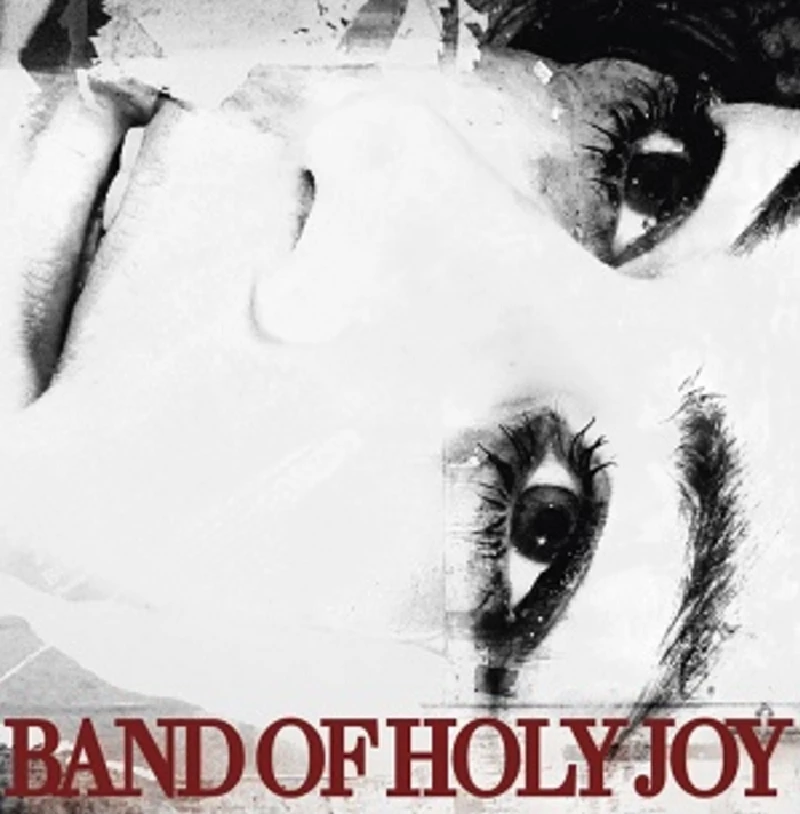
interviews |
|
Interview (2019) |
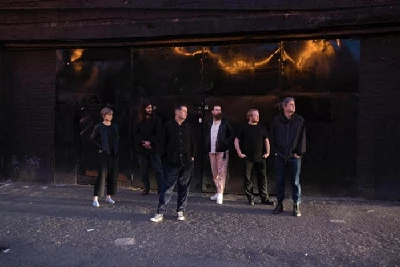
|
| In our fifth interview with them, John Clarkson talks to Johny Brown, Inga Tillere and James Stephen Finn from London-based alternative/indie rock band the Band of Holy Joy about their remarkable latest album, ‘Neon Primitives’. |
| Interview (2018) |
| Interview (2015) |
| Interview (2012) |
live reviews |
|
Tiger Lounge, Manchester, 27/9/2014 |
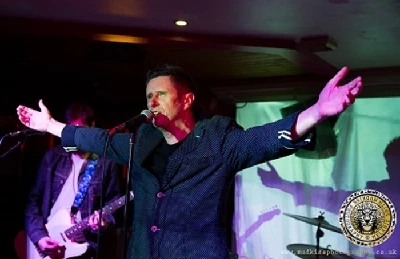
|
| Bill Seagrave watches the Band of Holy Joy play an atmospheric and inventive set at the Tiger Lounge in Manchester |
features |
|
(With Moon Under Water and Dream Maps), Water Rats, London, 17/1/2020 (2019) |
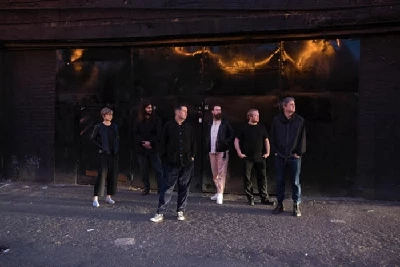
|
| We profile our next London Pennyblackmusic Bands' night which will take place with The Band of Holy Joy, Moon Under Water and Dream Maps at the Water Rats on the 17th January, 2020. |
| (With the Cathode Ray), Wee Red Bar, Edinburgh, 10/12/2017 (2017) |
| (With the Bitter Springs and Idiot Son), Macbeth, London, 9/1/2015 (2015) |
reviews |
|
Brutalism Begins at Home (2017) |
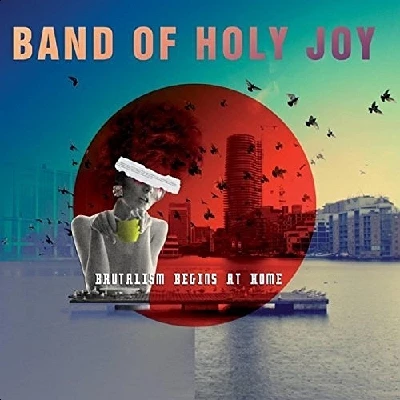
|
| Appealing new EP from London-based alternative rock the Band of Holy Joy which has been released on ten inch vinyl and digitally |
| A Plain Cookerybook for the Working Classes (2016) |
| An Atlas of Spatial Practice (2016) |
| Land of Holy Joy (2014) |
| A Place Called Home (2014) |
| City of Tales (Vol. 1 and 2) (2013) |
most viewed articles
current edition
Carl Ewens - David Bowie 1964 to 1982 On Track: Every Album, Every SongArmory Show - Interview with Richard Jobson
Bathers - Photoscapes 1
Colin Blunstone - Thalia Hall, Chicago, 16/7/2025
Visor Fest - Valencia, Spain, 26/9/2025...27/9/2025
Billie Eilish - O2 Arena, London, 10/7/2025
Robert Forster - Interview
Loft - Interview
John McKay - Interview
Editorial - July 2025
previous editions
Heavenly - P.U.N.K. Girl EPManic Street Preachers - (Gig of a Lifetime) Millennium Stadium, Cardiff, December 1999
Oasis - Oasis, Earl's Court, London, 1995
Trudie Myerscough-Harris - Interview
Beautiful South - Ten Songs That Made Me Love...
Pixies - Ten Songs That Made Me Love...
Prolapse - Interview
Simon Heavisides - Destiny Stopped Screaming: The Life and Times of Adrian Borland
Paul Clerehugh - Interview
Doris Brendel - Interview
most viewed reviews
current edition
Amy Macdonald - Is This What You've Been Waiting For?Sick Man of Europe - The Sick Man of Europe
Alice Cooper - The Revenge of Alice Cooper
Phew, Erika Kobayashi,, Dieter Moebius - Radium Girls
Davey Woodward - Mumbo in the Jumbo
Lucy Spraggan - Other Sides of the Moon
Blueboy - 2
Cynthia Erivo - I Forgive You
Philip Jeays - Victoria
Lapsley - I'm a Hurricane, I'm a Woman In Love
related articles |
|
Band of Holy Joy/Cathode Ray: Feature (2016 |
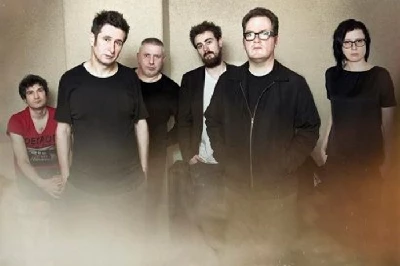
|
| Pennyblackmusic presents three acts from the Edinburgh-based label – The Band of Holy Joy, The Cathode Ray and Roy Moller – at the Sebright Arms on April 15th |
| Morton Valence: Interview (2014) |
Pennyblackmusic Regular Contributors
Adrian Janes
Amanda J. Window
Andrew Twambley
Anthony Dhanendran
Benjamin Howarth
Cila Warncke
Daniel Cressey
Darren Aston
Dastardly
Dave Goodwin
Denzil Watson
Dominic B. Simpson
Eoghan Lyng
Fiona Hutchings
Harry Sherriff
Helen Tipping
Jamie Rowland
John Clarkson
Julie Cruickshank
Kimberly Bright
Lisa Torem
Maarten Schiethart